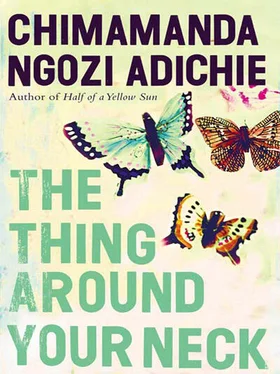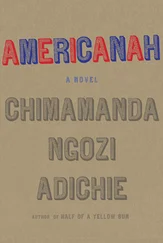“Have you tried finding a lawyer?” she asked.
“A lawyer for what? I don’t have a case.” He was biting his lower lip, and she had not seen him look so unattractive before, with his flaking facial skin and his shadowed eyes. She would not ask for more details because she knew he was unwilling to tell her more.
“You look terrible. You haven’t eaten much since I last saw you,” she said, thinking of all the weeks that she had spent talking about Udenna while Chinedu worried about being deported.
“I’m fasting.”
“Are you sure you don’t want me to drop you off at church?”
“It’s too late anyway.”
“Come with me to my church then.”
“You know I don’t like the Catholic Church, all that unnecessary kneeling and standing and worshiping idols.”
“Just this once. I’ll go to yours with you next week.”
Finally he got up and washed his face and changed into a clean sweater. They walked to the car in silence. She had never thought to tell him about her shivering as he prayed on that first day, but because she longed now for a significant gesture that would show him that he was not alone; that she understood what it must be like to feel so uncertain of a future, to lack control about what would happen to him tomorrow — because she did not, in fact, know what else to say — she told him about the shivering.
“It was strange,” she said. “Maybe it was just my suppressed anxiety about Udenna.”
“It was a sign from God,” Chinedu said firmly.
“What was the point of my shivering as a sign from God?”
“You have to stop thinking that God is a person. God is God.”
“Your faith, it’s almost like fighting.” She looked at him. “Why can’t God reveal himself in an unambiguous way and clear things up once and for all? What’s the point of God being a puzzle?”
“Because it is the nature of God. If you understand the basic idea of God’s nature being different from human nature, then it will make sense,” Chinedu said, and opened the door to climb out of the car. What a luxury to have a faith like his, Ukamaka thought, so uncritical, so forceful, so impatient. And yet there was something about it that was exceedingly fragile; it was as if Chinedu could conceive of faith only in extremes, as if an acknowledgment of a middle ground would mean the risk of losing everything.
“I see what you mean,” she said, although she did not see at all, although it was answers like his that, years back, had made her decide to stop going to church, and kept her away until the Sunday Udenna used “staid” in an ice-cream shop on Nassau Street.
Outside the gray stone church, Father Patrick was greeting people, his hair a gleaming silver in the late morning light.
“I’m bringing a new person into the dungeon of Catholicism, Father P.,” Ukamaka said.
“There’s always room in the dungeon,” Father Patrick said, warmly shaking Chinedu’s hand, saying welcome.
The church was dim, full of echoes and mysteries and the faint scent of candles. They sat side by side in the middle row, next to a woman holding a baby.
“Did you like him?” Ukamaka whispered.
“The priest? He seemed okay.”
“I mean like like.”
“Oh, Jehova God! Of course not.”
She had made him smile. “You are not going to be deported, Chinedu. We will find a way. We will.” She squeezed his hand and knew he was amused by her stressing of the “we.”
He leaned close. “You know, I had a crush on Thomas Sankara, too.”
“No!” Laughter was bubbling up in her chest.
“I didn’t even know that there was a country called Burkina Faso in West Africa until my teacher in secondary school talked about him and brought in a picture. I will never forget how crazy in love I fell with a newspaper photograph.”
“Don’t tell me Abidemi sort of looks like him.”
“Actually he does.”
At first they stifled their laughter and then they let it out, joyously leaning against each other, while next to them, the woman holding the baby watched.
The choir had begun to sing. It was one of those Sundays when the priest blessed the congregation with holy water at the beginning of Mass, and Father Patrick was walking up and down, flicking water on the people with something that looked like a big saltshaker. Ukamaka watched him and thought how much more subdued Catholic Masses were in America; how in Nigeria it would have been a vibrant green branch from a mango tree that the priest would dip in a bucket of holy water held by a hurrying, sweating Mass-server; how he would have stridden up and down, splashing and swirling, holy water raining down; how the people would have been drenched; and how, smiling and making the sign of the cross, they would have felt blessed.
The Arrangers Of Marriage
My new husband carried the suitcase out of the taxi and led the way into the brownstone, up a flight of brooding stairs, down an airless hallway with frayed carpeting, and stopped at a door. The number 2B, unevenly fashioned from yellowish metal, was plastered on it.
“We’re here,” he said. He had used the word “house” when he told me about our home. I had imagined a smooth driveway snaking between cucumber-colored lawns, a door leading into a hallway, walls with sedate paintings. A house like those of the white newlyweds in the American films that NTA showed on Saturday nights.
He turned on the light in the living room, where a beige couch sat alone in the middle, slanted, as though dropped there by accident. The room was hot; old, musty smells hung heavy in the air.
“I’ll show you around,” he said.
The smaller bedroom had a bare mattress lodged in one corner. The bigger bedroom had a bed and dresser, and a phone on the carpeted floor. Still, both rooms lacked a sense of space, as though the walls had become uncomfortable with each other, with so little between them.
“Now that you’re here, we’ll get more furniture. I didn’t need that much when I was alone,” he said.
“Okay,” I said. I felt light-headed. The ten-hour flight from Lagos to New York and the interminable wait while the American customs officer raked through my suitcase had left me woozy, stuffed my head full of cotton wool. The officer had examined my foodstuffs as if they were spiders, her gloved fingers poking at the waterproof bags of ground egusi and dried onugbu leaves and uziza seeds, until she seized my uziza seeds. She feared I would grow them on American soil. It didn’t matter that the seeds had been sun-dried for weeks and were as hard as a bicycle helmet.
“Ike agwum,” I said, placing my handbag down on the bedroom floor.
“Yes, I’m exhausted, too,” he said. “We should get to bed.”
In the bed with sheets that felt soft, I curled up tight like Uncle Ike’s fist when he is angry and hoped that no wifely duties would be required of me. I relaxed moments later when I heard my new husband’s measured snoring. It started like a deep rumble in his throat, then ended on a high pitch, a sound like a lewd whistle. They did not warn you about things like this when they arranged your marriage. No mention of offensive snoring, no mention of houses that turned out to be furniture-challenged flats.
My husband woke me up by settling his heavy body on top of mine. His chest flattened my breasts.
“Good morning,” I said, opening sleep-crusted eyes. He grunted, a sound that might have been a response to my greeting or part of the ritual he was performing. He raised himself to pull my nightdress up above my waist.
“Wait—” I said, so that I could take the nightdress off, so it would not seem so hasty. But he had crushed his mouth down on mine. Another thing the arrangers of marriage failed to mention — mouths that told the story of sleep, that felt clammy like old chewing gum, that smelled like the rubbish dumps at Ogbete Market. His breathing rasped as he moved, as if his nostrils were too narrow for the air that had to be let out. When he finally stopped thrusting, he rested his entire weight on me, even the weight of his legs. I did not move until he climbed off me to go into the bathroom. I pulled my nightdress down, straightened it over my hips.
Читать дальше











